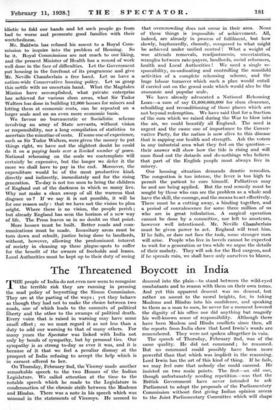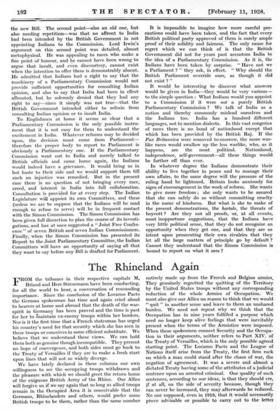The Threatened Boycott in India
THEpeople of India do not even now seem to recognize the terrible risk they are running in pressing the mad policy of boycotting the Simon Commission. They are at the parting of the ways ; yet they behave as though they had not to make the choice between two roads, one of which leads to the summits of political liberty and the other to the swamps of political death. Every voice that is raised in warning may have some small effect ; so we must regard it as not less than a duty to add our warning to that of many others. For many years the Spectator was linked with India not only by bonds of sympathy, but by personal ties. Our sympathy is as strong to-day as ever it was, and it is because of it that we feel a peculiar dismay at the prospect of India refusing to accept the help which is in earnest - offered to her.
On Thursday, Febraary 2nd, the Viceroy made another remarkable speech to the two Houses of the Indian Legislature. We called attention at the time to the notable speech which he made to the Legislature in condemnation of the chronic strife between the Moslems and Hindus. There was a note in his speech which was unusual in the statements of Viceroys: He seemed to descend into the plain—to stand between the wild-eyed combatants and to reason with them on their own terms. And yet this apparent descent was no descent, but rather an ascent to the moral heights, for, in taking Moslems and Hindus into his confidence, and speaking to them as a man to men, he never for a moment lowered the dignity of his office nor did anything but magnify his well-known sense of responsibility. Although there have been Moslem and Hindu conflicts since then, all the reports from India show that Lord Irwin's words are remembered. They were not spoken altogether in vain.
The speech of Thursday, February 2nd, was of the same quality. He did not command ; he reasoned. But no command could possibly have been more powerful than that which was implicit in the reasoning. Lord Irwin has the art of this kind of thing. If he fails, we may feel sure that nobody else could succeed. He insisted on two main points. The first—an old one, though unfortunately needing repetition—was that the British Government have never intended to ask Parliament to adopt the proposals of the Parliamentary Commission without first giving Indian opinion access to the Joint Parliamentary Committee which will shape the new Bill. The second point—also an old one, but also needing repetition—was that no affront to India had been intended by the British GO-vernment in not appointing Indians to the Commission. Lord Irwin's argument on this second point was detailed, almost metaphysical. " He was appealing to races who make a fine point of honour, and he cannot have been wrong to argue that insult, and even discourtesy, cannot exist when the intention to offer them is demonstrably absent. He admitted that Indians had a right to say that the machinery of a Parliamentary Commission would not provide sufficient opportunities for consulting Indian opinion, and also to say that India had been in effect affronted, but he solemnly denied that they had any right to s4—since it simply was not true—that the British Government intended either to refrain from consulting Indian opinion or to insult India.
To Englishmen at home it seems so clear that a Parliamentary Commission is the only possible instru- ment that it is not easy for them to understand the excitement in India. Whatever reforms may be decided upon, the decision must come from Parliament— therefore the proper body to report to Parliament is obviously a Parliamentary one. If the Parliamentary Commission went out to India and merely talked to British officials and came home again, the Indians would indeed have a grievance. It would bring us in hot haste to their side and we would support them till such an injustice was remedied. But in the present case there is no question of not bringing every race, creed, and interest in India into full collaboration. Consultation is provided for at every step. The Indian Legislature will appoint its own Committees, and these (unless we are to suppose that the Indians will be mad enough to refuse to serve) will be in frequent contact with the Simon Commission. The Simon Commission has been given full discretion to plan the course of its investi- gations, and has at once suggested a " Joint Free Confer- ence " of seven British and seven Indian Commissioners. Finally, when the Simon Commission has presented its Report to the Joint Parliamentary Committee, the Indian Committees will have an opportunity of saying all that they want to say before any Bill is drafted for Parliament. It is impossible to imagine how more careful pre- cautions could have been taken, and the fact that every British political party approved of them is surely ample proof of their solidity and fairness. The only cause fOr regret which we can think of is that the British Government did not for years past accustom India to the idea of a Parliamentary Commission. As it is, the Indians have been taken by surprise. " Have not we a Parliament " they ask, in effect. " Why should the British Parliament override ours, as though it did not exist ? "
It would be interesting to discover what answers would be given in India—they would be very Various— to the simple question : What Indians would you appoint to a Commission if it were not a purely British Parliamentary Commission ? We talk of India as a nation and thereby commonly mislead ourselves and the Indians too. India has a hundred different languages, not to mention dialects. In this vast congeries of races there is no bond of nationhood except that which has been provided by the British Raj. If the Pax Britannica were removed to-morrow, the more war- like races would swallow up the less warlike, who, as it happens, are the most political. Nationhood, independence, self-government--all these things would be farther off than ever.
In whatever degree the Indians demonstrate their ability to live together in peace and to manage their own affairs, to the same degree will the pressure of the ruling hand be lightened. Britain looks anxiously for signs of encouragement in the work of reform. She wants to give more freedom ; she only wants to be assured that she can safely do so without committing cruelty • in the name of kindness. But what is she to make of the present demonstrations, the hartals, the threats of boycott ? Are they not all proofs, or, at all events, most inopportune suggestions, that the Indians have very little political sense, that they do not recognize an opportunity when they get one, and that they are so intent upon prosecuting their own rivalries that they let all the large matters of principle go by default ? Cannot they understand that the Simon Commission is bound to report on what it sees ?







































 Previous page
Previous page